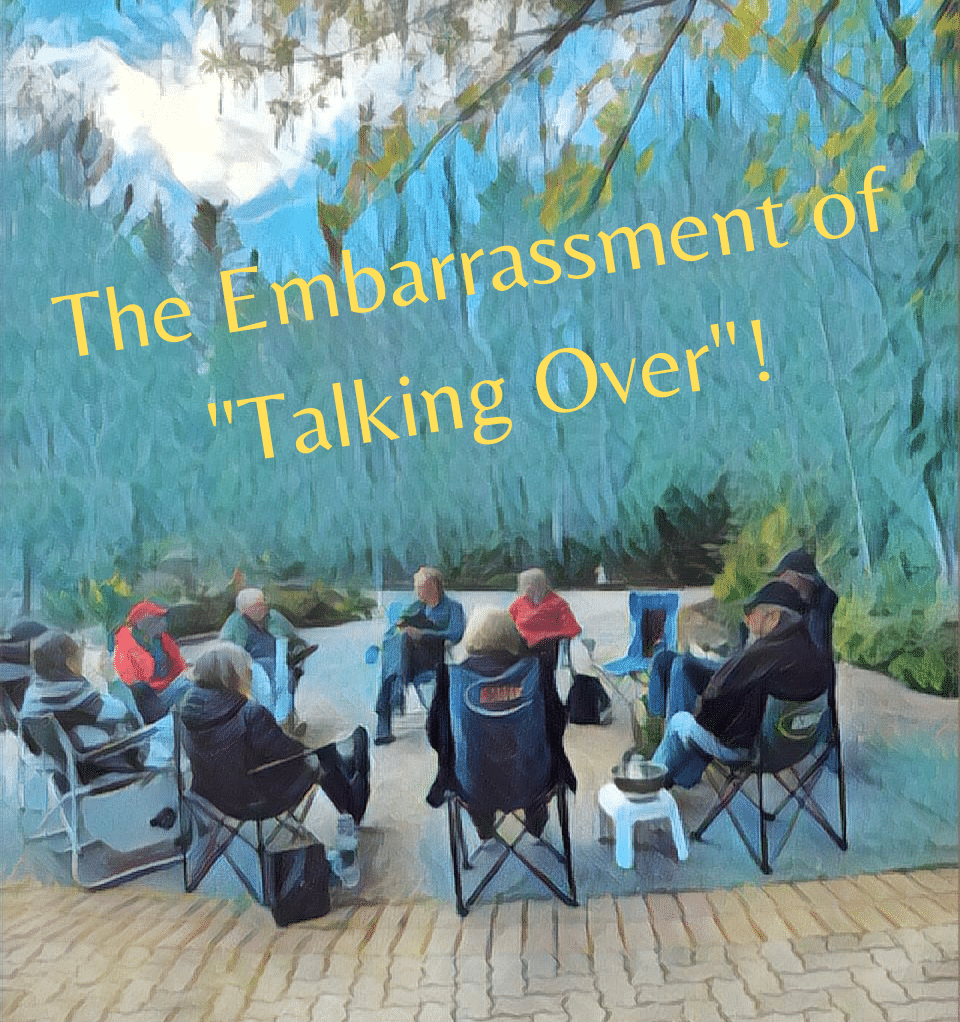I had one of those bad hearing moments the other day, the kind you don’t hear about until later.
It was a talk over thing.
During the pandemic, a group of neighbours started meeting outside on Friday nights for cocktails. Our houses are in pods of three, so we call this happy hour ‘podcocks’, short for pod cocktails. We sit in a circle, which is challenging for a person with hearing loss.
On Saturday morning, the Hearing Husband told me that three times during the previous evening’s podcocks, I had cut off one of our neighbours as he started to speak. I talked over him. Suffering from an attack of retroactive embarrassment, I shot off an email of apology.
Every person has a list of things that irritate or embarrass them about their own hearing loss, starting with the basic one of not being able to hear very well.
- The eternal need to say pardon or would you repeat that, please?
- Having people reply “oh never mind” when you do.
- Not being able to follow the conversation.
- Being forced into Bluffing.
- Being caught at Bluffing.
- People continually forgetting what you need, and these are the ones who are supposed to love you!
But what tops the charts for me is ‘talking over’ someone in a group conversation, cutting them off as they start to speak or even if they have been talking for a while.
We do this because we didn’t hear them talking. Perhaps they have a soft voice. Maybe we are looking the other way when they start to speak. There may be background noise. Regardless of the reason, I find it humiliating to be caught doing this – but why? As an advocate, I’m supposed to have this hearing loss thing down pat and that includes accepting that we make communication mistakes.
However, it’s more about making a social boo-boo. I’ve been part of the reaction when someone else does something awkward in a group conversation, so I know the little conspiratorial smile that people share: “Oh she did it again, but that’s so her. But hey, we’ll just let her go on…”
Even ‘hearing people’ talk over others, but people with hearing loss do it frequently. We’re not rude, although it may seem like it when we just jump in, often loudly, with whatever we want to say. And then we carry on until we are finished, or if we notice what we’ve done, or if someone gives us a signal.
And it’s this signal that can reduce me, momentarily, to emotional rubble.
Another person will hold up a warning finger to me and point to the person talking. I suppose this is the best way, silent and relatively discreet, because not everyone will see that finger (one hopes). Or someone will look at me, shake their head slightly and say (at what seems to be a thundering volume, but probably isn’t), “Hang on, Gael, Bob is talking.” This is a well-meant but still mildly crushing way of saying “Shut up, talk-hog, it’s not your turn.”
The only way to prevent ‘talking over’ is to make completely sure no one in your conversation group is already talking; then it’s fair game who gets to speak next. But in reality, by the time you see that the field is clear, someone else has already jumped into the silence. This is why many people with hearing loss simply don’t join the conversation; they stay silent because they don’t want to risk “talking over”. Others grab the stage and don’t stop talking until the moon rises. That way, they don’t have to hear.
Again, everyone does this from time to time. While you still might squirm when it happens, it helps to develop the confidence to say, “Oh, sorry Bob, I didn’t hear you. What were you saying?” Then you listen with interest until it’s your turn.
As for the email I sent off to my neighbour, he wrote back: “No problem, I’m sure it was nothing important. I like you just the way you are.” Whew!







The Talking Stick will do it, Gael! Back in the day at work, to control some interruptive speakers (of which I was only one), we used a Homer Simpson doll. It may not be well received at “podcocks” but you can introduce a “talking stick” (whatever you choose, Homer Simpson, a beanie baby, a Rubik’s cube) and see how they like it. They may, but if they don’t, they will understand so much better how reliant you are on sight to prevent you from talking (or taking) over.
Another amazing article. Thanks Gael!
Twice a week we have a family Zoom call with 8 participants. (We also have an interpreter..). I do a moderate raise of hand to signal I want to say something…and someone always calls on me at an appropriate time. In the case of this group of neighbors i would remind them of my hearing loss and what they can do to let me know that my raised hand indicates I have something to say when the current talker finishes.
You described that problem well, Gael. I’ve had that experience many times. Also, its so embarrassing to bring up something that has already been discussed or answered, but I didn’t hear it. When I am missing a lot of the conversation I tend to clam up because I’m not sure if I am repeating something that was talked about earlier.